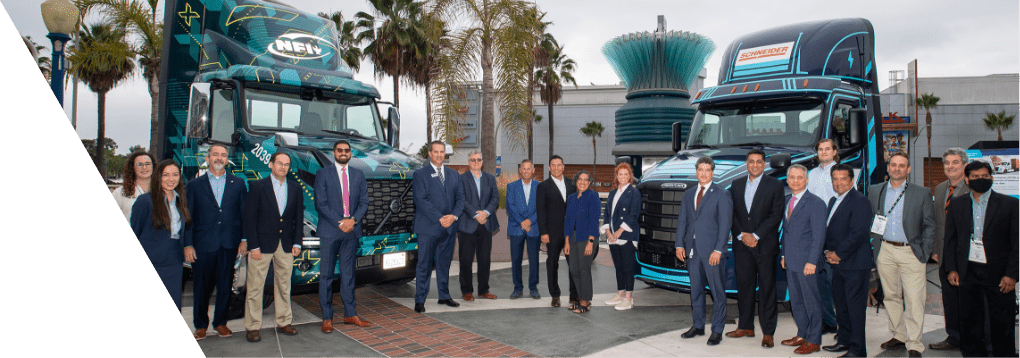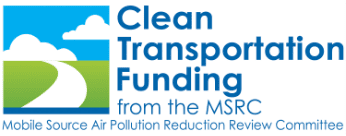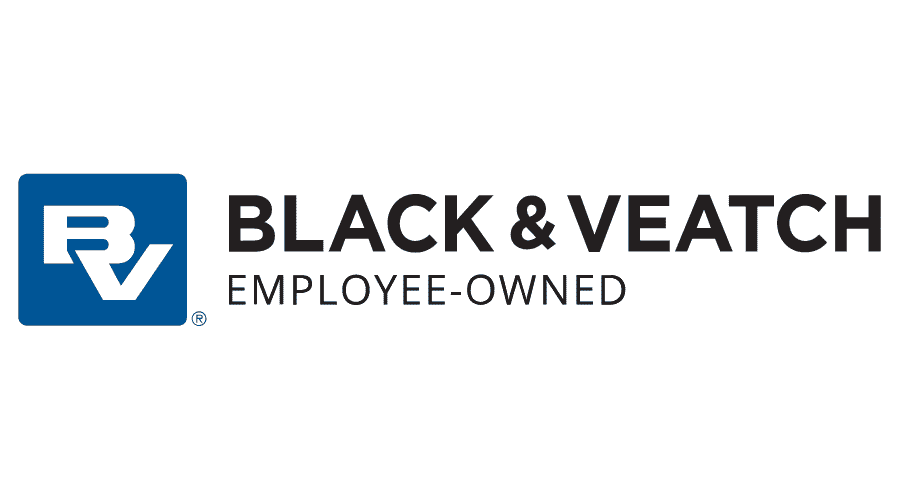NFI is a fully integrated third-party supply chain solutions provider with an extensive history in sustainable and innovative technologies. Serving customers around the world and the transportation sector for 90 years, its company-owned fleet consists of more than 4,600 tractors and 13,000 trailers. An award-winning EPA SmartWay Partner and High Performer, NFI’s electric fleet has traveled more than 750,000 miles to date and remains the only fleet that was part of the Volvo LIGHTS, DTNA Innovation Fleet, and Switch-On projects.
Role in JETSI
NFI is one of two fleets deploying trucks for JETSI and operates 50 Class 8 battery-electric trucks (BETs) from its Ontario warehouse facility, with charging systems, as well as 1 MW of on-site solar and 5 MWh of energy storage. The 30 electric Freightliner eCascadia and 20 electric Volvo VNR trucks operate in freight drayage routes serving Southern California and its seaports.
Schneider is a premier multimodal provider of transportation, intermodal, and logistics services. With more than 85 years of experience and 200 facilities worldwide, Schneider is the fifth largest for-hire fleet in North America with 9,000 company-owned tractors and decades of experience deploying alternative fuels and advanced vehicle technologies. An EPA SmartWay partner and 11-time SmartWay Excellence Awardee, the company is a long-time champion of fuel efficiency and freight consolidation efforts. A demonstrated and awarded leader in sustainable transportation, the company is well equipped and committed to support electric truck deployment.
Role in JETSI
Schneider is operating 50 electric Freightliner eCascadia trucks, provided through the JETSI grant, within the company’s intermodal operations in Southern California. These trucks cover daily freight routes along some of Southern California’s most congested freight corridors, eliminating the pollution and GHG emissions that would otherwise have occurred with diesel trucks. Schneider is performing drayage and freight delivery, with an estimated daily range of 175 miles/driver.
Daimler Truck North America (DTNA) is one of North America’s leading manufacturers of commercial vehicles. DTNA’s work in the design, development, deployment, and commercialization of previous heavy-duty hybrid-electric technologies and battery-electric technologies demonstrates the capacity to successfully bring products to market in large volumes. DTNA regularly convenes its largest and most interested fleet customers along with major utilities to create pathways and partnerships for full fleet electrification.
Role in JETSI
DTNA delivered 80 battery-electric Freightliner eCascadias to both Schneider (50) and NFI (30).
Volvo Trucks, part of the Volvo Trucks global organization, is one of North America’s leading heavy-duty truck manufacturers. The company provides complete transport solutions for its customers, offering a full range of diesel, alternative fuel, and electric vehicles. Every truck for the North American market – including the Class 8 VNR Electric model – is assembled at the company’s New River Valley manufacturing facility in Dublin, Virginia. Volvo Trucks is focused on supporting customers in their electromobility transition by building a network of Volvo Trucks Certified EV Dealerships across North America.
Role in JETSI
Volvo Trucks delivered 20 Volvo VNR Electric trucks to NFI.
South Coast AQMD (South Coast AQMD) is the air pollution control agency for all of Orange County and the urban portions of Los Angeles, Riverside, and San Bernardino counties. This area is home to more than 16.8 million people — about half the population of California.
Facilitating cooperative partnerships with private industry, academic and research institutions, technology developers, and government agencies to cosponsor projects, South Coast AQMD has had tremendous success demonstrating the use of clean fuels and zero-emission technologies.
Role in JETSI
South Coast AQMD assembled the project team, led the grant application effort, and serves as the project administrator and liaison to the funding agencies including California Air Resources Board (CARB), California Energy Commission (CEC), Mobile Source Air Pollution Reduction Committee (MSRC), San Pedro Bay Ports and SCE. The project also benefits from $5.43 million in funding from the agency.
The California Air Resources Board (CARB) promotes and protects public health, welfare, and ecological resources through the reduction of air pollutants while considering the economy. CARB is the lead agency for climate change programs and oversees all air pollution control efforts in California to attain health-based air quality standards. JETSI is part of California Climate Investments (CCI), a statewide initiative that puts billions of cap-and-trade dollars to work reducing greenhouse gas emissions, strengthening the economy, and improving public health and the environment, particularly in disadvantaged communities.
Role in JETSI
The project was funded with $16.02 million from CARB’s CCI Initiative, in addition to other sources of funding.
The California Energy Commission (CEC) is leading the state to a 100% clean energy future. It has seven core responsibilities: developing renewable energy, transforming transportation, increasing energy efficiency, investing in energy innovation, advancing state energy policy, certifying thermal power plants, and preparing for energy emergencies. CEC’s Clean Transportation Program invests up to $100 million annually to support California communities, increase access to zero-emission vehicle infrastructure, support innovation, and accelerate the deployment of advanced transportation and fuel technologies.
Role in JETSI
The CEC is providing $10.96 million in funds from its Clean Transportation Program.
TRC Companies’ Clean Transportation Solutions (CTS) team, formerly known as Gladstein, Neandross & Associates (GNA), is a leading North American consulting firm specializing in market development for low- and zero-emission transportation technologies, infrastructure, and ultra-low carbon fuels for commercial transportation, particularly in the medium- and heavy-duty vehicle sectors.
Role in JETSI
TRC’s CTS team played a key role in developing the grant proposals for JETSI and provide technical expertise through reporting and analysis services, ZEV workforce plan development, and industry outreach and education.
The San Pedro Bay Ports are two of the busiest container ports in the U.S. and have a joint Clean Air Action Plan (CAAP) that guides their commitment to reduce air emissions associated with port-related operations. In 2017, Los Angeles and Long Beach committed to a Large-Scale Drayage Truck Pilot Program to advance production of clean technologies, demonstrate feasibility, and provide meaningful data in real world port operations. Funding for JETSI is part of their CAAP and Drayage Truck Pilot.
Role in JETSI
The Ports provided a combined total of $3 million in funding to offset a portion of the cost of the new heavy-duty battery-electric trucks.
Since 1990, the Mobile Source Air Pollution Reduction Review Committee (MSRC) has invested more than $400 million in hundreds of clean transportation initiatives that reduce air pollution from motor vehicles throughout the South Coast Region. MSRC brings together diverse perspectives on air quality issues. Through the co-funding of alternative fuel vehicles, the program has helped the region move closer to achieving smog standards and reduced the residents’ exposure to airborne toxics and other pollutants founds in diesel emissions.
Role in JETSI
The support of the JETSI project is part of the MSRC FY2018-2021 Work Program on advancing commercialization of Class 8 battery-electric trucks and EVSE, and large fleet deployments for zero-emission drayage trucks operating between the Ports, railyards, and warehouse facilities in the Inland Empire.
Electrify Commercial – a business unit from Electrify America – provides customized end-to-end electric vehicle (EV) charging solutions to businesses, utility companies, fleet owners, travel centers and convenience stores. Leveraging the expertise of Electrify America’s established network of over 800 DC fast charging stations with speeds of 150 kW and 350 kW, Electrify Commercial is uniquely skilled in helping businesses meet their electrification goals.
.
Role in JETSI
Electrify Commercial provides NFI with charger network services, charger maintenance, and microgrid management.
Southern California Edison (SCE) is the primary electricity supply company for much of Southern California. Through its Charge Ready Transport (CRT) Program, SCE provides low- to no-cost make-ready charging infrastructure for fleet customers procuring medium and heavy-duty electric vehicles.
Role in JETSI
SCE is the utility provider for both fleets in the JETSI project and has committed up to $5 million in funding towards the deployment of JETSI fleets through CRT, which helps fleets offset their charging infrastructure costs. SCE is integrally involved in assessing the JETSI sites for fleet electrification, performing engineering services and developing site design plans for charging infrastructure, upgrading distribution electric service as needed, installing dedicated meters and circuits for charging equipment, performing construction, and more.
Power Electronics’ 25,000-plus employees design, manufacture, and distribute power stations and charging points to provide energy for all types of electric vehicles. Power Electronics provides engineering support, off-grid commissioning, on-call customer service, on-site assistance, spare parts warranty, and user training courses. Their EVSE have been deployed under DTNA’s CX project and as part of several other HD EV projects throughout North America.
Role in JETSI
Power Electronics provided Schneider’s charging equipment and provide network and maintenance services. In addition, Power Electronics’ over-the-air software is projected to manage peak shaving to minimize strain on the grid during peak demand hours.
As California’s only statewide organization working exclusively on air-quality issues, the Coalition for Clean Air (CCA) has a deep knowledge of collaborating with advocates, organizations, companies, and legislators across the state to improve air quality. With a focus on equity, freight transport, clean transportation, and air quality advocacy, CCA has convened groups such as Charge Ahead California and California Cleaner Freight Coalition.
Role in JETSI
CCA, in partnership with TRC, host meetings with environmental and public health groups, community-based organizations, and environmental justice organizations, as well as meetings with local government leaders to gather feedback on the project. The CCA project team prepares presentation materials for each of the groups and schedule each meeting.
The Los Angeles Cleantech Incubator (LACI) is a nonprofit driving innovation and growth of Los Angeles’ green economy, located at the La Kretz Innovation Campus in Downtown Los Angeles. LACI connects industry professionals and supports collaborative efforts for technology advancement. Its staff of entrepreneurs, market specialists, and researchers, combined with an advisor network, provide critical resources to cleantech startups. LACI also has a workforce development division with 100 fellows to train the next generation of clean transportation workers.
Role in JETSI
LACI’s Enhancing Communities developed a zero-emissions workforce plan by delivering a survey to analyze data against established performance indicators and metrics.
LACI’s Market Transformation convenes workshops focused on the innovation needs of the heavy-duty trucking industry, with one focused on infrastructure, charging, and energy management, and the other focused on the vehicle and operations.
The Electric Power Research Institute (EPRI) has conducted research, development, and demonstration projects to focus on electricity generation, delivery, and collaboration with its U.S. member utilities. EPRI specializes in facilitating collaboration between the automotive and utility industries for the development of standards, vehicle demonstration programs, and advanced charging technologies — all backed by expertise in quantitative and qualitative data collection and analysis.
Role in JETSI
EPRI collects and analyzes charge metrics and operation dynamics from both vehicle and charger data. The project team installed and maintains all necessary monitoring equipment to collect data on recharging events, using its fleet performance uptime tool.
CALSTART specializes in the demonstration, assessment, and validation of emerging technologies and market growth through public policy, member-networking, and funding programming. CALSTART has significant expertise and background in fleet data collection, case studies and analysis, and helping to communicate the total cost of ownership and value in transitioning to alternative fuel vehicles.
Role in JETSI
CALSTART is developing case studies of NFI and Schneider’s project activities, using data collected during the JETSI project. The case studies will include aggregated and average electricity prices, installation labor hours and capital costs, charger reliability and insights into maintenance of charging systems, comparison analysis of baseline fuels, and additional data collected during the project. Furthermore, CALSTART will develop a “Start Up Experience” report which will document the initial installation, deployment activities, and experiences of each fleet.
Ricardo Strategic Consulting (RSC) is a global strategic engineering and environmental consultancy that specializes in the transportation and energy sectors. RSC’s Strategy Consulting division provides management consulting services that span the whole transportation value chain, offering a unique combination of deep industry knowledge, strategic breadth, and technical capability. RSC has extensive experience in supporting government initiatives and the transportation industry, supporting a wide range of clients through a variety of challenges, including product strategy, market assessment, growth opportunities, decarbonization, pilot project monitoring, fleet data collection, total cost of ownership analysis, and alternative fuel opportunities and challenges.
Role in JETSI
RSC is collecting operational data from the project to analyze economic and environmental impacts, supporting the data and analysis in the final report. Analysis includes monthly electronic (baseline versus battery-electric truck) data from the DTNA trucks, such as fueling information for each vehicle, shift logs based on driver entry on tablets, and weight information for every freight load, as well as maintenance logs for the trucks and chargers, electricity rates, and more. RSC will analyze and compare/contrast data with baseline trucks.
The College of Engineering – Center for Environmental Research and Technology (CE-CERT) within the University of California at Riverside is a recognized national leader in energy and environmental research and education. Established in 1992, CE-CERT brings together scientists and engineers from multiple disciplines to address society’s most pressing challenges in air quality, energy, climate change, and transportation. CE-CERT’s activities encompass all three aspects of the University of California’s overarching mission: research, education, and public service.
Role in JETSI
CE-CERT analyzes project data to evaluate energy savings potential of energy-efficient routing (eco-routing) for electric trucks.
A leader in the clean transportation industry, Black & Veatch has completed design, engineering, permitting, and construction for over 2,000 electric vehicle charging sites, totaling thousands of chargers, and the first U.S. hydrogen fueling station network. Black & Veatch brings the knowledge, experience, and end-to-end solutions to plan and deploy cost-efficient, sustainable, and resilient transportation and energy systems.
Role in JETSI
Black & Veatch is providing the design, engineering, permitting and installation of sixteen 350KW dual-corded EV charging dispensers and four 1.2 MW power cabinets to support the battery-electric trucks at the Schneider El Monte facility. As part of the site development, Black & Veatch is removing the existing gravel/dirt parking lot and installing a 14,900 square foot concrete parking lot.



















